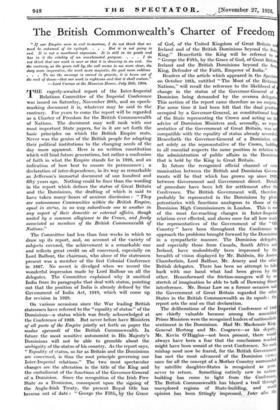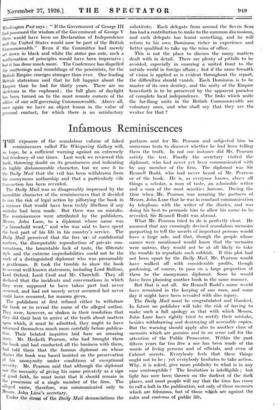The British Commonwealth's Charter of Freedom
"If our Empire were to end to-morrow, I do not think that wa steed be ashamed of ita epitaph. . . . But it is not going to end. It is not a moribund organism. It is still in its youth and has in it the vitality of an unexhausted purpose. . . . .1 do not think that our work is over or that it is 'drawing to an end. On the contrary, as the years roll by, the call seems to me more dear, the duty more imperative, the work mire majestic, the goal more sublime . . To me the message is carved in granite, it is hewn out of the rock of doom—that our work is righteous and that it shall endure." —Lord Curzon at the Mansion House, July 20th, 1904.
THE eagerly-awaited report of the Inter-Imperial Relations Committee of the Imperial Conference was issued on Saturday, November 20th, and an epoch- marking document it is, whatever may be said to the contrary. For years to come the report will be regarded as a Charter of Freedom for the British Commonwealth of Nations. The document may well rank with our most important State papers, for in it are set forth the basic principles on which the British Empire rests. Never was the genius of the British people for adapting their political institutions to the changing needs of the day more apparent. Here is no written constitution which will bind future generations, but rather a confession of faith in what the Empire stands for in 1926, and an indication of how best to ensure its permanence ; a declaration of inter-dependence, in its way as remarkable as Jefferson's immortal document of one hundred and fifty years ago. Nothing could be finer than the wording in the report which defines the status of Great Britain and the Dominions, the' drafting of which is said to have taken many-hours of anxious disciission : " They are autonomous Communities within- the British Empire, equal in status, in no way subordinate one to another in any aspect of their domestic or external affairs, though united by a common allegiance to the Crown, and freely associated as members of the British Commonwealth of Nations."
The Committee had less than four weeks in which to draw up its report, and, on account of the variety of subjects covered, the achievement is a remarkable one and reflects great credit on all concerned, especially on Lord Balfour, the chairman, who alone of the statesmen present was a member of the first Colonial Conference in 1887. No secret is divulged when we record the wonderful impression made by Lord Balfour on all the delegates. The Committee explained why it omitted India from its paragraphs that deal with status, pointing out that the position of India is already defined by the Government of India Act, 1919, which will come up for revision in 1929.
On various occasions since the War leading British statesmen have referred to the "equality of status" of the Dominions—a status which was freely acknowledged. at the Conference of 1928. But never before have Ministers of all parts of the Empire jointly set forth on paper the modus operandi of the British Commonwealth. In future the most sensitive autonomist in His Majesty's Dominions will not be able to grumble about the ambiguity of the status of his country. As the report says, " Equality of status, so far as Britain and the Dominions are concerned, is thus the root principle governing our Inter-Imperial relations." The two most spectacular changes are the alteration in the title of the King and the curtailment of the functions of the Governor-General of a Dominion. Since the recognition Of the Irish Free State as a Dominion, consequent upon the signing of the Anglo-Irish Treaty, the present Royal title • has become out of date : " George the Fifth, by the Grace of God, of the United Kingdom of Great Britain an Ireland and of the British Dominions beyond the Seas King." Henceforth the Kihg will be referred to " George the Fifth, by the Grace of God, of Great Brit • Ireland and the British Dominions beyond the S King, Defender of the Faith, Emperor of India."
Readers of the article which appeared in the Special on October 16th, entitled " The Moot of the Britanni Nations," will recall the reference to the likelihood of change in the status of the Governor-General of Dominion being demanded by the oversea delegates This section of the report came therefore as no surprise For some time it had been felt that the dual positio occupied by a Governor-General, as constitutional hea of the State representing the Crown and acting on th advice of Dominion Ministers and, secondly, as repre sentative of the Government of Great Britain, was no compatible with the equality of status already accorded Henceforth the Governor-General of a Dominion w' act solely as the representative of the Crown, holdin in all essential respects the same position in relation the administration of public affairs in the Doniinio that is held by the King in Great Britain.
In future the recognized official channel of eon munication between the British and Dominion Govern ments will be that which has grown up since 1923, between Government and Government direct. Details of procedure have been left for settlement after th Conference. The British Government will, therefore, probably 'be represented in the Dominions by pleni. potentiaries with functions analogous to those of the Dominion High Commissioners in London. This is one of the most far-reaching changes in Inter-Imperial relations ever effected, and shows once for all how ready the representatives of the Government of the " Old Country " have been throughout the Conference to approach the problems brought forward by the Dominion in a sympathetic manner. The Dominion delegates, and especially those from Canada, South Africa and Ireland, have undoubtedly been impressed by the breadth of vision displayed by Mr. Baldwin, Sir Austen Chamberlain, Lord Balfour, Mr. Amery and the other British delegates. There has been no attempt to take back with one hand what had been given by the other. Henceforward the friction-mongers will by no stretch of imagination be able to talk of Downing Street interference. Mr. Bonar Law on a former occasion said the Government of Great Britain regarded the other States in the British Commonwealth as its equals : the report sets the seal on that declaration. The deliberations of the Imperial Conference of 1926 are chiefly valuable because among the assembled Prime Ministers were the recognized leaders of nationalistic sentiment in the Dominions. Had Mr. Mackenzie King, General Hertzog and Mr. Cosgrave—or his deputy, Mr. Kevin O'Higgins—not been present, there would always have been a fear that the conclusions reached might have been unsaid at the next Conference. No such mishap need now be feared, for the British -Government has met the most advanced of the Dominion views; once for all the concept of a Mother Country surrounded by satellite daughter-States is recognized as gone, never to return. Something entirely new in nation- building has come to light from the Conference. The British Commonwealth has blazed a trail through unexplored regions of State-building, and world opinion has been fittingly impressed, Inter. alia the Washington Post says : " If the Government of George III had possessed the wisdom of the Government of George V there would have been no Declaration of Independence and the United States would now be part of the British Commonwealth." Even .if the Cominittee had merely set down in black and white the status quo ante, such a reaffirmation- of principles would have been impressive ; but it has done much more. The Conference has dispelled the mutterings and mumblings of the pessimists, for the British Empire emerges stronger than ever. One leading British statesman said that he felt happier about the Empire than he had for thirty years. There are no skeletons in the cupboard ; the full glare of daylight has been turned on to the most remote corners of the edifice of our self-governing Commonwealth. Above all, once again we have an object lesson in the value of personal contact, for which there is no satiSfactory substitute. Each delegate from around the Seven Seas has had a contribution to make to the common discussions, and each delegate has learnt something, and he will return to his own Dominion richer in experience and better qualified to take up the reins of office.
This is not the place to discuss the many matters dealt with in detail. There are plenty of pitfalls to be avoided, especially in ensuring a united front to the outside world in foreign affairs ; but if the same breadth of vision is applied as is evident throughout the report, the difficulties should vanish. Each Dominion is to be master of its own destiny, and the unity of the Empire henceforth is to be preserved by the apparent paradox of complete local independence. The links which unite the far-flung units in the British Commonwealth arc voluntary ones, and who shall say that they are the Weaker for that ?



















































 Previous page
Previous page